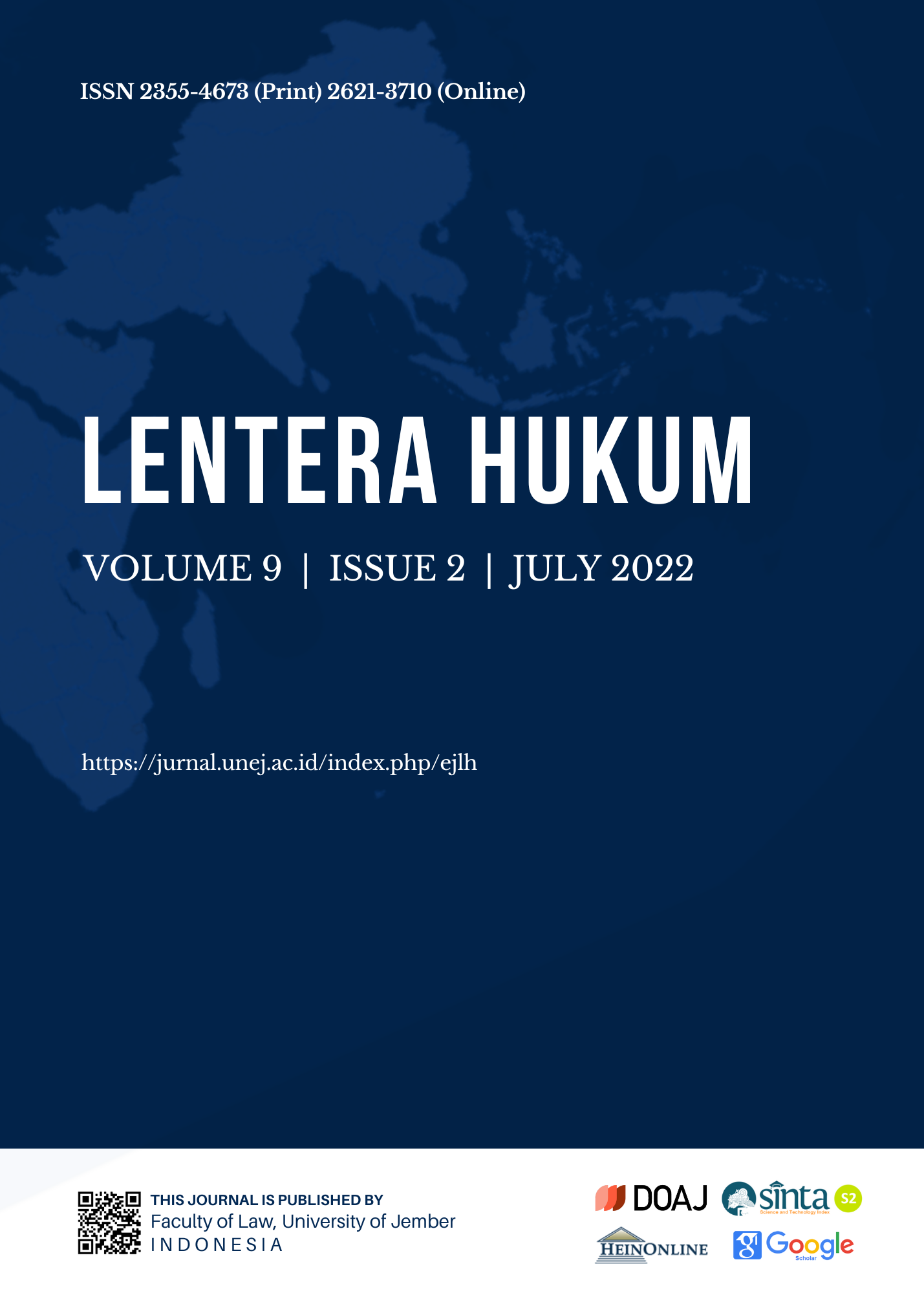Can the Job Creation Law Solve the Lack of Public Participation in Indonesia's Spatial Planning?
DOI:
https://doi.org/10.19184/ejlh.v9i2.30635Abstract
It has been long recognized that public participation plays a vital role in dealing with spatial planning laws. However, mechanisms for the inclusion of public participation have been criticized worldwide for lacking the hallmarks of actual participation, as this trend has also occurred in Indonesia. This paper aimed to analyze the significance of public participation in Indonesia's spatial planning and whether the current Job Creation Law can solve the lack of public participation. There are no legal consequences or sanctions if the government fails to conduct public participation, while the Job Creation Law is regarded to encourage public participation by enabling the public to be actively involved in every stage of spatial planning. By employing normative research, this paper shows that the Job Creation Law reiterates the same flaws by neglecting the importance of legal consequences for not conducting public participation. The implementing regulation rests uncertainty that can reduce and discourage public participation. As the Job Creation Law was highly expected to cope with the issue, it cannot involve the public properly in spatial planning.
Keywords: Job Creation Law, Spatial Planning, Public Participation.
Downloads
References
Alister J Scott et al, “Disintegrated Development at the Rural-Urban Fringe: Re-connecting Spatial Planning Theory and Practice†(2013) 83 Progress in Planning 1–52.
Arimbi Ramadhani, “Survei: 95 Persen Warga Tidak Dilibatkan dalam Penyusunan RTRW Jakarta [Survey: 95 Percent Residents are not involved in the preparation of Jakarta’s Spatial Planningâ€, Kompas (14 February 2017), online: <https://properti.kompas.com/read/2017/02/
14/142414821/survei.95.persen.warga.tidak.dilibatkan.dalam.penyusunan.rtrw.jakarta>.
Bernhard Brackhahn & Risto Kärkkäinen, eds, Spatial Planning as an Instrument for Promoting Sustainable Development in the Nordic countries: Action Programme for 2001–2004 (Copenhagen: The Ministry of Environment Denmark, 2001).
Bronwen Morgan & Karen Yeung, An Introduction to Law and Regulation: Text and Materials, 1st ed (Cambridge: Cambridge University Press, 2017).
Gregory Jones, “The Impact of Environmental Law on Planning DecisionMaking†(2012) 40 Journal of Planning and Environtal Law.
Hertiari Idajati, Adjie Pamungkas, & Vely Kukinul S, “The level of participation in Mangrove ecotourism development, Wonorejo Surabaya†(2016) 227 Procedia - Social and Behavioral Science 515–520.
Hilda B Alexander, “Dosen ITN Malang Ciptakan Aplikasi Pengendalian Tata Ruang†[A Lecturer of ITN Malang Created An Application for Controlling Spatial Planâ€, Kompas.com (8 May 2017), online:<https://properti.kompas.com/read/2017/05/08/171644221/dosen.itn.malang.ciptakan.aplikasi.pengendalian.tata.ruang>.
I Gusti Ngurah Parikesit Widiatedja, “Fragmented Approach to Spatial Management in Indonesia: When it Will Be Ended?†(2021) 43:2 Kertha Patrika.
———, “Job Creation Law and Foreign Direct Investment in Tourism in Indonesia: Is It Better than Before?†(2022) 6:1 Udayana Journal of Law Culture.
Irawati I & IBRA Sastha, Peran Serta Masyarakat dalam Penataan Ruang: Studi Kasus Pengembangan Kawasan Primer Gedebage [Public Participation in Spatial Planning: A Case Study of Gedebage Primary Area] (Yogyakarta, 2008).
I Nyoman Suyatna, Asas-asas Umum Pemerintahan yang Baik dalam Pembentukan Peraturan daerah†[Good Governance Principles in the Making of Regional Regulation] (PhD Thesis, University of Brawijaya, 2011).
Jack Tsen-Ta Lee, “We Built This City: Public Participation in Land Use Decisions in Singapore†(2016) 10:2 Asian Journal of Comparative Law.
John Braithwaite, “Responsive Regulation and Developing Economies†(2006) 34:5 World Development 884–898.
John Graham, Bruce Amos, & Tim Plumptre, Principles for Good Governance in the 21st Century (Institute on Governance).
Joko Riskiyono, “Partisipasi Masyarakat dalam Pembentukan Perundangundangan untuk Mewujudkan Kesejahteraan†[Public Participation in the Formation of Legislation to Achieve Prosperity†(2015) 6:2 Aspirasi.
Lavhelani Kgobe, France Khutso, & John Mamokhere, “The Value of Public Participation in Land-Use Planning for Redeeming Congestion in South Africa Municipalities†(2021) 26 Technium Social Sciences Journal.
MaÅ‚gorzata Krajewska, Sabina Źróbek, & MaruÅ¡ka Å ubic KovaÄ, “The Role of Spatial Planning in the Investment Process in Poland and Slovenia†(2014) 22:2 Real Estate Management and Valuation.
Musri Nauli, “Reading the Indonesian Omnibus Bill on Job Creationâ€, Heinrich Boll Stift Southeast Asia (17 July 2020), online: <https://th.boell.org/en/2020/07/17/reading-indonesian-omnibuslaw-job-creation>.
N Taylor, “What Is This Thing Called Spatial Planning? An Analysis of the British Government’s View†(2010) 81:2 The Town Planning Review.
Nurhadi Sucahyo, “Ketidakjelasan Bayangi Putusan MK Soal UU Cipta Kerjaâ€, VOA Indones (Desember 2020), online: <https://www.voaindonesia.com/a/ketidakjelasan-bayangi-putusan-mk-soal-uucipta-kerja-/6338052.html>.
Otto Spijkers, Xian Li, & Liping Dai, “Public Participation in China’s Water Governance†(2018) 2:1 Chinese Journal of Environmental Law.
Petir Garda Bhwana, “DPR Job Creation Deliberation Lack Public Participation, says FRIâ€, Tempo (21 February 2020), online: <https://en.tempo.co/read/1333738/dpr-job-creation-deliberationlack-public-participation-says-fri>.
Phil Allmendinger & Graham Haughton, “The Evolution and Trajectories of Neoliberal Spatial Governance: ‘Neoliberal’ Episodes in Planning†(2013) 28:1 Plan Practice & Research.
Philip Boland, “The Relationship between Spatial Planning and Economic Competitiveness: the ‘Path to Economic Nirvana’ or a ‘Dangerous Obsession’?†(2014) 46:4 Environment and Planning A: Economy and Space.
Robert Stokes, “Defining the Ideology of Public Participation: Democracy, Devolution, Deliberation, Dispute Resolution and a New System for Identifying Public Participation in Planning Law†(2012) 8:2 Macquarie Journal of International and Comparative Environmental
Law.
Sally A Maling’a, “Public Participation in County Governance in Kenya: A Withering Eucalyptus in a Desert Middle†(2017) East African Law Journal.
Sherry Arnstein, A Ladder of Citizen Participation (1969).
Stephen Tromans, “Planning and Environmental Law: Uneasy Bedfellows?†(2012) 40 Journal of Planning & Environmental Law.
Suciati, Partisipasi Masyarakat dalam Penyusunan Rencana Umum Tata Ruang Kota Pati†[Public Participation in the Preparation of General Spatial Plan of the City of Pati (Master Thesis, University of Diponegoro, 2006).
Wei-Ju Huang & Ana MarÃa Fernández-Maldonado, “High-tech development and spatial planning: comparing the Netherlands and Taiwan from an institutional perspective†(2016) 24:9 European Planning Studies.
Yim King Penny Wan & Bill Bramwell, “Political Economy and the Emergence of a Hybrid Mode of Governance of Tourism Planning†(2015) 50 Tour Manag.
Zhu Qian, “Master Plan, Plan Adjustment and Urban Development Reality under China’s Market Transition: A Case Study of Nanjing†(2013) 30 Cities.



